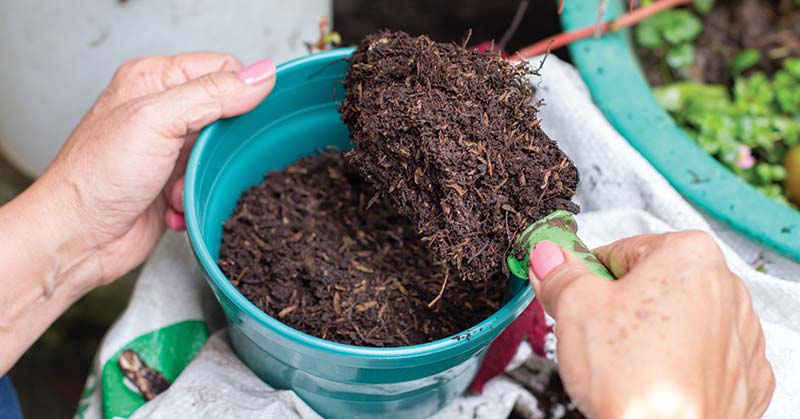Herbs have a special place in the heart of every gardener. Whether you’re a culinary enthusiast looking to add zest to your dishes, or a plant lover aiming for a fragrant, green sanctuary, growing herbs can be incredibly rewarding. However, the secret to robust, flavorful herbs lies in the soil where they grow.
This blog post delves into the world of compost – an essential ingredient for a thriving herb garden.
Understanding Compost and Its Importance
Before we dive into the specifics, let’s understand what compost is and why it’s so crucial for herbs. Compost is decomposed organic matter that enriches the soil. It improves soil structure, provides essential nutrients, and enhances moisture retention – all vital for the healthy growth of herbs.
Why Herbs Love Compost
Herbs, like all plants, require a balance of nutrients, water, and air in the soil. Compost provides this balance, making it an ideal growing medium. It slowly releases nutrients, which is perfect for herbs that generally prefer not to be over-fertilized.
Choosing the Best Compost for Herbs
- Homemade Compost:
- Benefits: Homemade compost is economical and environmentally friendly. You can control the materials used, ensuring a natural, chemical-free compost.
- How to Make: Combine green waste (kitchen scraps, grass clippings) and brown waste (dry leaves, branches) in a compost bin. Turn regularly and allow it to decompose.
- Worm Castings:
- Benefits: Worm castings are a nutrient-rich, organic form of compost. They are excellent for water retention and provide a slow release of nutrients.
- Usage: Mix worm castings with your potting soil, or top-dress the soil around your herbs.
- Composted Manure:
- Benefits: Manure from cows, horses, or chickens is high in nutrients. It’s especially good for herbs that require more fertile soil.
- Caution: Ensure the manure is well-composted to avoid burning the plants.
- Leaf Mold:
- Benefits: Leaf mold is decomposed leaves, fantastic for improving soil structure and moisture retention.
- Making Leaf Mold: Collect fallen leaves, moisten them, and store in a bag or pile for a year to decompose.
- Mushroom Compost:
- Benefits: A byproduct of the mushroom growing industry, this compost is rich in organic matter.
- Note: It can be alkaline, so check the pH if your herbs prefer acidic soil.
How to Use Compost in Your Herb Garden
- Mix into Soil: When preparing your garden beds or pots, mix compost into the soil.
- Top Dressing: Spread a layer of compost around the base of your herbs.
- Compost Tea: Steep compost in water and use the liquid to water your herbs for a nutrient boost.
Conclusion
The right compost can make all the difference in your herb garden, leading to healthier plants and more flavorful harvests. Whether you choose to make your own compost or use a commercial product, remember that the goal is to create a nutrient-rich, well-draining environment for your herbs to thrive in.
FAQs on Best Compost for Herbs
Q: What is compost and why is it important for growing herbs?
A: Compost is decomposed organic matter that enriches the soil. It’s crucial for herb growth because it improves soil structure, provides essential nutrients, and enhances moisture retention, creating an ideal environment for herbs to thrive.
Q: Can I make my own compost for herbs, and how?
A: Yes, you can make your own compost by combining green waste (like kitchen scraps and grass clippings) and brown waste (such as dry leaves and branches) in a compost bin. Turn it regularly and allow it to decompose over time.
Q: Are worm castings good for herb gardens?
A: Absolutely! Worm castings are an excellent, nutrient-rich organic form of compost. They’re great for water retention and provide a slow release of nutrients, which is beneficial for herbs.
Q: Can I use composted manure for my herb garden?
A: Yes, composted manure from cows, horses, or chickens is high in nutrients and beneficial for herbs. However, ensure it’s well-composted to avoid burning the plants.
Q: What is leaf mold, and how is it beneficial for herbs?
A: Leaf mold is decomposed leaves, which is excellent for improving soil structure and moisture retention. It’s created by collecting fallen leaves, moistening them, and allowing them to decompose over a year.
Q: Is mushroom compost suitable for all herbs?
A: Mushroom compost is rich in organic matter and generally good for herbs. However, it can be alkaline, so it’s important to check the soil pH if your herbs prefer acidic conditions.
Q: How should I apply compost to my herb garden?
A: You can mix compost into the soil when preparing beds or pots, use it as a top dressing around the base of your herbs, or make compost tea by steeping compost in water and using the liquid to water your herbs.
Q: Can over-composting harm herb plants?
A: Yes, over-composting can lead to nutrient overload, which can harm herbs. Herbs typically prefer not to be over-fertilized, so it’s important to use compost moderately and appropriately.
Q: How often should I add compost to my herb garden?
A: This can vary depending on the compost type and the needs of your specific herbs. Generally, adding compost at the beginning of the growing season and then top-dressing as needed throughout the season is sufficient.
Q: Can I use compost for herbs grown in containers?
A: Yes, compost is excellent for container-grown herbs. Mix it with your potting soil or use it as a top dressing to provide your container herbs with essential nutrients and improve soil structure.




